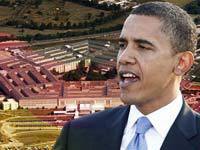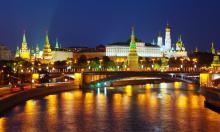The Biggest Stars of International Politics in 2009
2009 revealed many impressive foreign politicians. Some were expected to shine, like Barack Obama or Hugo Chavez. Others became the center of attention unexpectedly.

Pravda.Ru created its own rating of foreign politicians who affected the events of 2009 the most.
Barack Obama
The new US President was expected to introduce fundamental changes to George W. Bush foreign policy. Certain changes did occur. Obama ordered to shut down CIA’s secret prisons. He called the rest of the world to pay attention to the Islamic world. He chose not to criticize Russia and changed the nature of Russian-American relations.
However, many deeds are yet to be done. Middle-Eastern process is still at a dead-end. Negotiations with Russia regarding strategic nuclear weapons were not successful. However, Obama was awarded the Nobel Prize in the first year of his presidency, and this Prize is regarded as an advance.
Hugo Chavez
The main gesture of the Venezuelan President last year was recognition of the independence of South Ossetia and Abkhazia. In Latin America, his actions in regard to a possible war with Columbia, the US ally, deserve special attention.
Chavez shocked people on a number of occasions. For instance, when he decided to sit in a live TV broadcast four days in a row. Granted, he only lasted a day and a half. When he was expected to throw a tantrum at the UN General Assembly, he was surprisingly reserved and stated after Obama’s speech that “It doesn’t smell of sulphur here anymore, it’s gone. It smells of something else: hope.”
Silvio Berlusconi
The Italian Prime Minister became the central figure of gossip columns among politicians. Every week media would write about his love affairs that made his wife divorce him. When Berlusconi was attacked in December, even his political opposition was empathetic.
Berlusconi had another unpleasant event this year – his blanket protection was removed. Now, he theoretically can be brought to trial for possible connections with mafia. Berlusconi is not bothered since he had hundreds of court hearings and always came out clean. He is still popular among his compatriots.
Recep Tayyip Erdoğan
The Turkish Prime Minister deserved his spot in the rating for accusing Israel of genocide of Palestinians during the war in the Gaza Strip and leaving the Economic Forum in Davos. He is the only Turkish leader with an anti-Israeli stance of this kind.
Erdoğan gave the green light for signing of an agreement about diplomatic relations with Armenia and laid the foundation for settling disagreements of the two nations. He was a smooth player in the energy sector. On the one hand, he signed a document regarding the construction of Nabucco gas pipeline, on the other hand, he allowed Russia to run the South Stream pipeline through Turkish waters.
Alexander Lukashenko
The Belarusian President did certain things last year that deserved attention. He made two visits to Europe – Italy and Lithuania – after ten year break. He managed to extend the suspension of the existing EU sanctions against him.
His relations with Russia were complicated. One of the instances was the “milk war.” There were rumors that Lukashenko was going to befriend the EU and was about to break up with Russia. But it never happened. It was a successful year as Lukashenko made friends with Europe and retained fraternal relations with the Russian Federation.
Mahmoud Ahmadinejad
The President of Iran has been drawing attention to his persona for a while. The last year was not an exception. Ahmadinejad criticized the US and Israel on a number of occasions and was adamant in his unwillingness to discuss a possibility of the completion of the nuclear program. He was not scared of a threat of implementing more rigorous sanctions.
Some in the West were hoping that radical Ahmadinejad would lose the election onJune 12, but he won. The opposition supported by the West has been protesting in downtown Teheran for several months, and a great deal of blood has been spilt. Yet, the Iranian President seems to be doing just fine.
Vaclav Klaus
The President of Czech Republic became the main obstacle for entering into effect of the main EU document, the Lisbon Agreement. Even positive results of the referendum in Ireland have not won him over. Klaus signed the document only because the Constitutional Court of Czech Republic failed to find anything contradictory to the main legislation of the country.
Prior to that, he managed to get a significant concession from the EU. Czech Republic is not covered by the Chart of Rights and freedoms, which could have caused multimillion law suits from evicted Germans. The Czech leader demonstrated that even a small country can sometimes decide the fate of the entire continent.
Yukio Hatoyama
Coming to office of the new Japanese Prime Minister Yukio Hatoyama became a real revolution. He is the first Prime Minister to head the ruling Democratic Party instead of the Liberal-Democratic Party that ruled for over 60 years.
Yukio Hatoyama said that improving relations with Russia was his priority. So far, he only repeated demands of his predecessor regarding the Southern Kuril Islands. While in Japan he marked the beginning of the new period, he has not made any significant changes in foreign policy, at least, regarding Russia.
Traian Băsescu
In 2009, the Romanian President had several victories. In the beginning of the year, his country won its argument with Ukraine over the Snake Island, and now Romanians secured a right for obtaining oil and gas next to the island. In the end of the year, Băsescu was re-elected as the president, winning by a slim 0.5 percent.
Băsescu played an important role in the events in Moldova that he called the second Romanian country. He was the one to initiate a conversation about possible unification of the two countries. This would cause re-bordering of Europe, therefore Băsescu is carefully watched by the entire continent.
Moammar Gaddafi
Libyan Leader Moammar Gaddafi is interesting just because last year he celebrated 40 years in office. This is an absolute record among non-monarch leaders. The year was also marked with Libya receiving its citizen who blew up a plane 21 years ago. Gaddafi also proposed creation of the United States of Africa.
Libya’s relations with the West are improving. For the first time in years, Gaddafi visited the US and gave a speech at the General Assembly. It was not without a scandal. During his speech he threw the UN Charter on the floor. The incident had no effect on the fact that Libya is no longer an outcast.
Pratibha Patil
The President of India marked the year with a flight on a Russian battle plane Su-30 MKI. Patil is the first female President who flew in the cabin of a military plane. Another achievement was the launching of the first Indian nuclear submarine Arihant.
Anders Fogh Rasmussen
In 2009, NATO received a new General Secretary. Rasmussen, who had been the head of the Denmark’s government for eight years, became the first in history Prime Minister who was given this position in NATO.
In previous years, he fiercely criticized Russia and called for granting NATO membership to Georgia and Ukraine. This did not stop him from taking an active part in thawing relations with Russia that worsened after the conflict in the Caucasus. Rasmussen also managed to restore the relations with Turkey after he refused to apologize for a caricature of the Prophet Muhammad. NATO received a more experienced and flexible leader than it seemed earlier.
Vadim Trukhachev
Pravda.ru
Subscribe to Pravda.Ru Telegram channel, Facebook, RSS!




